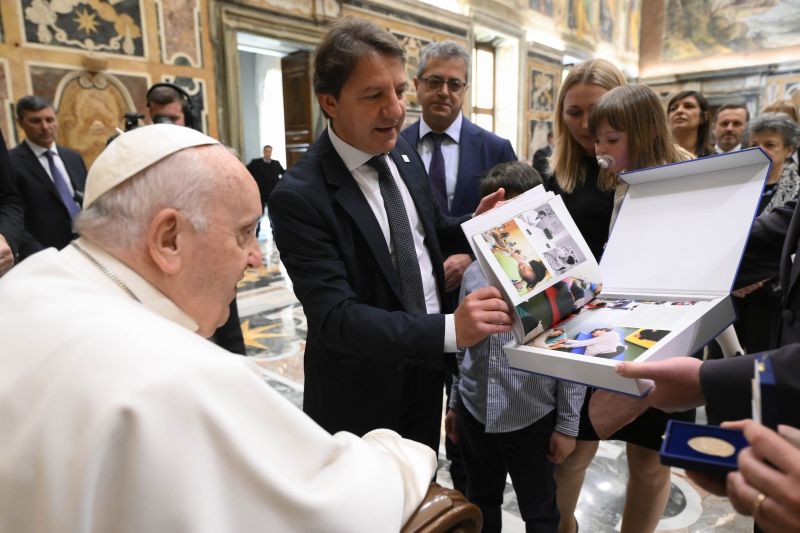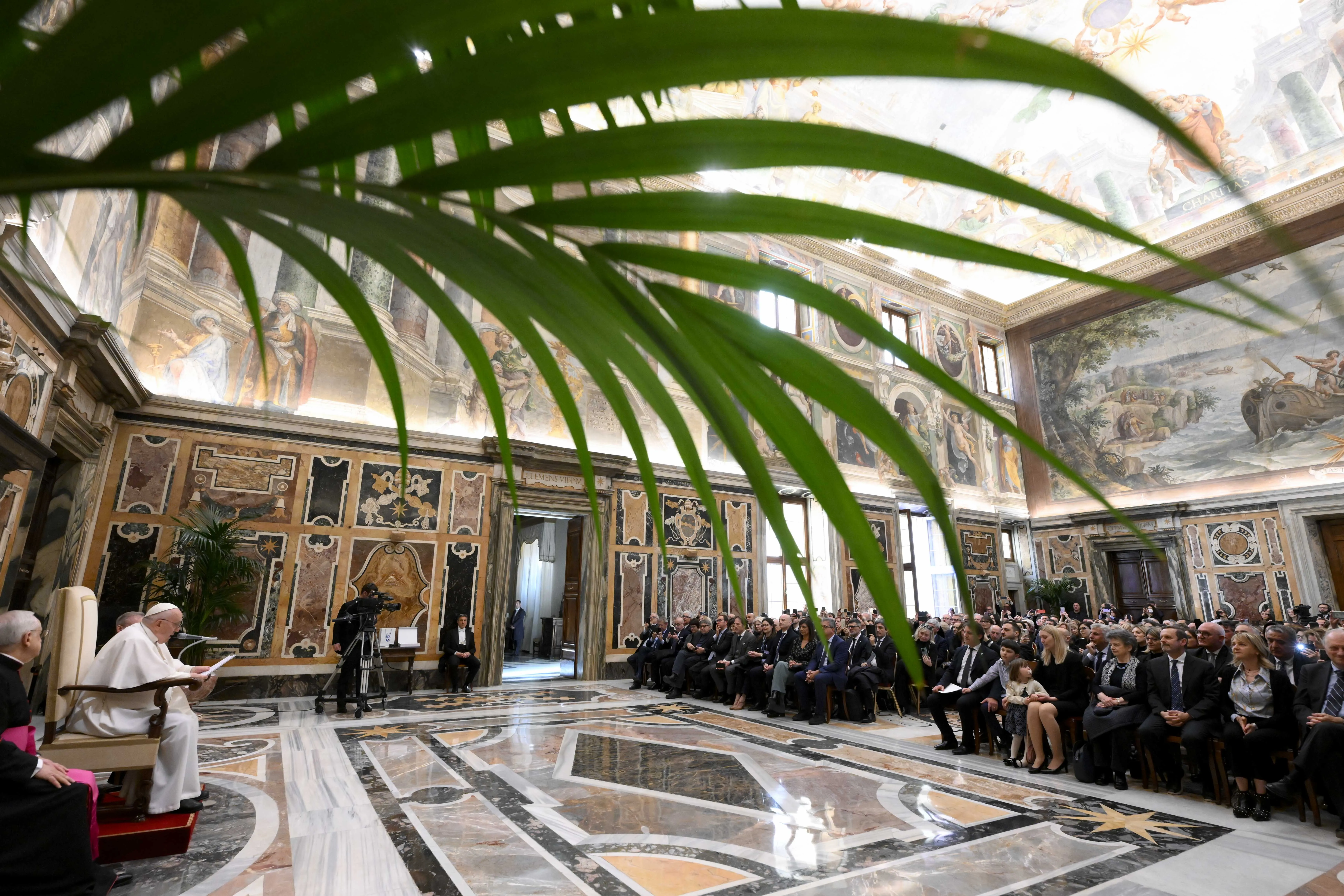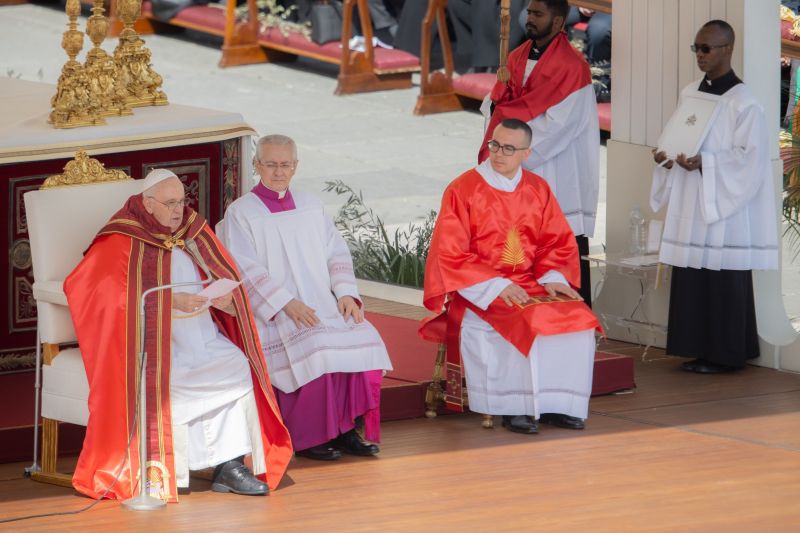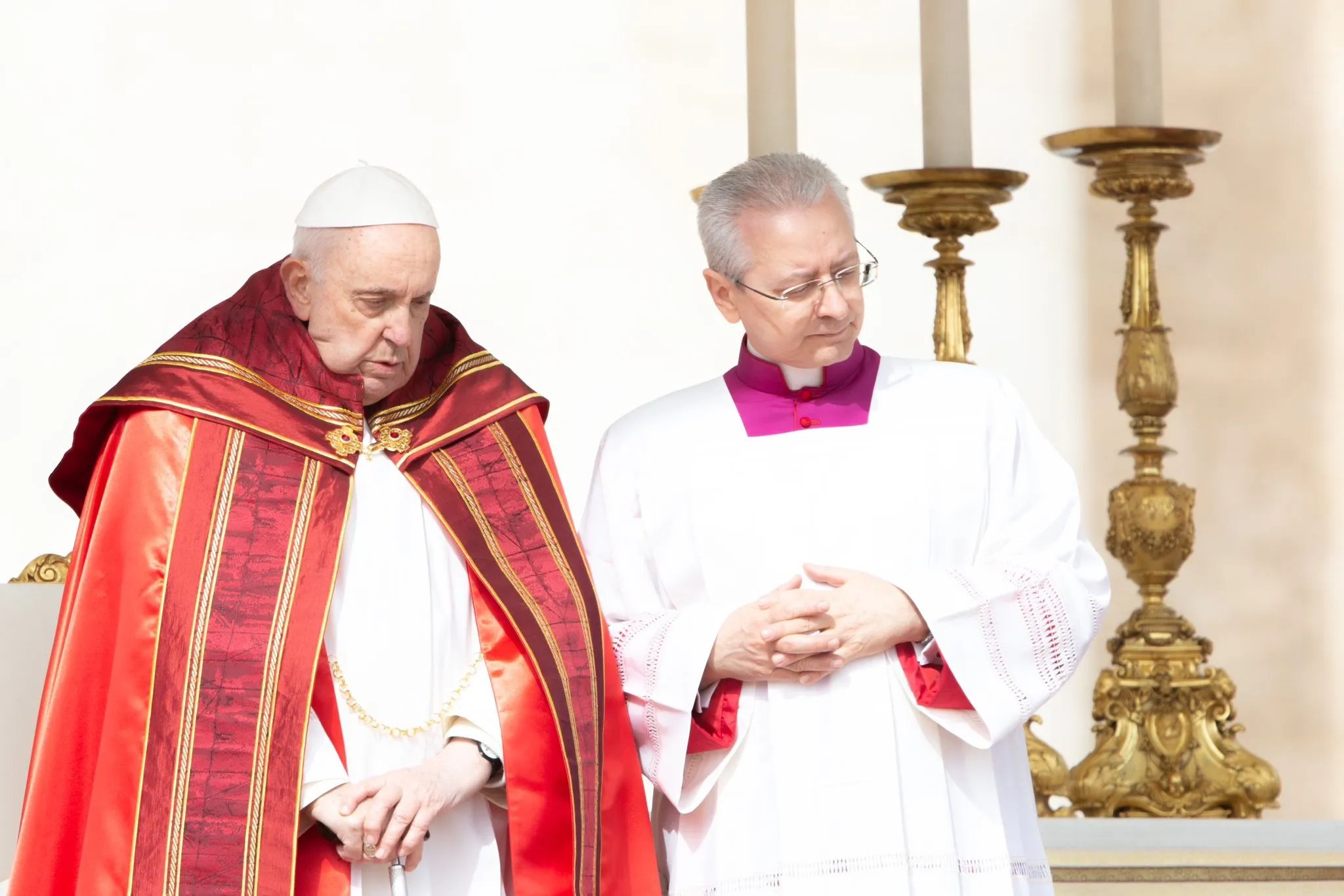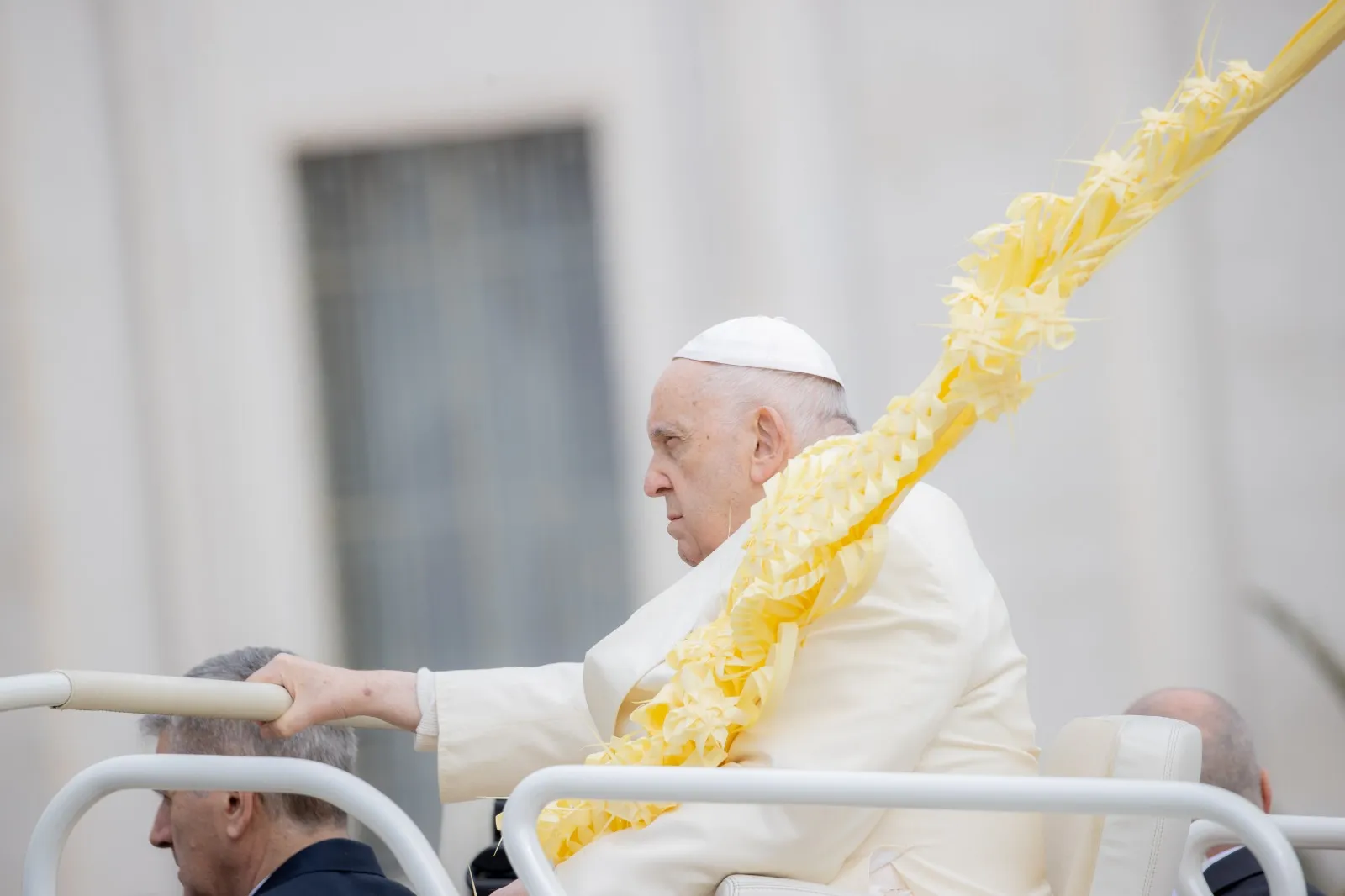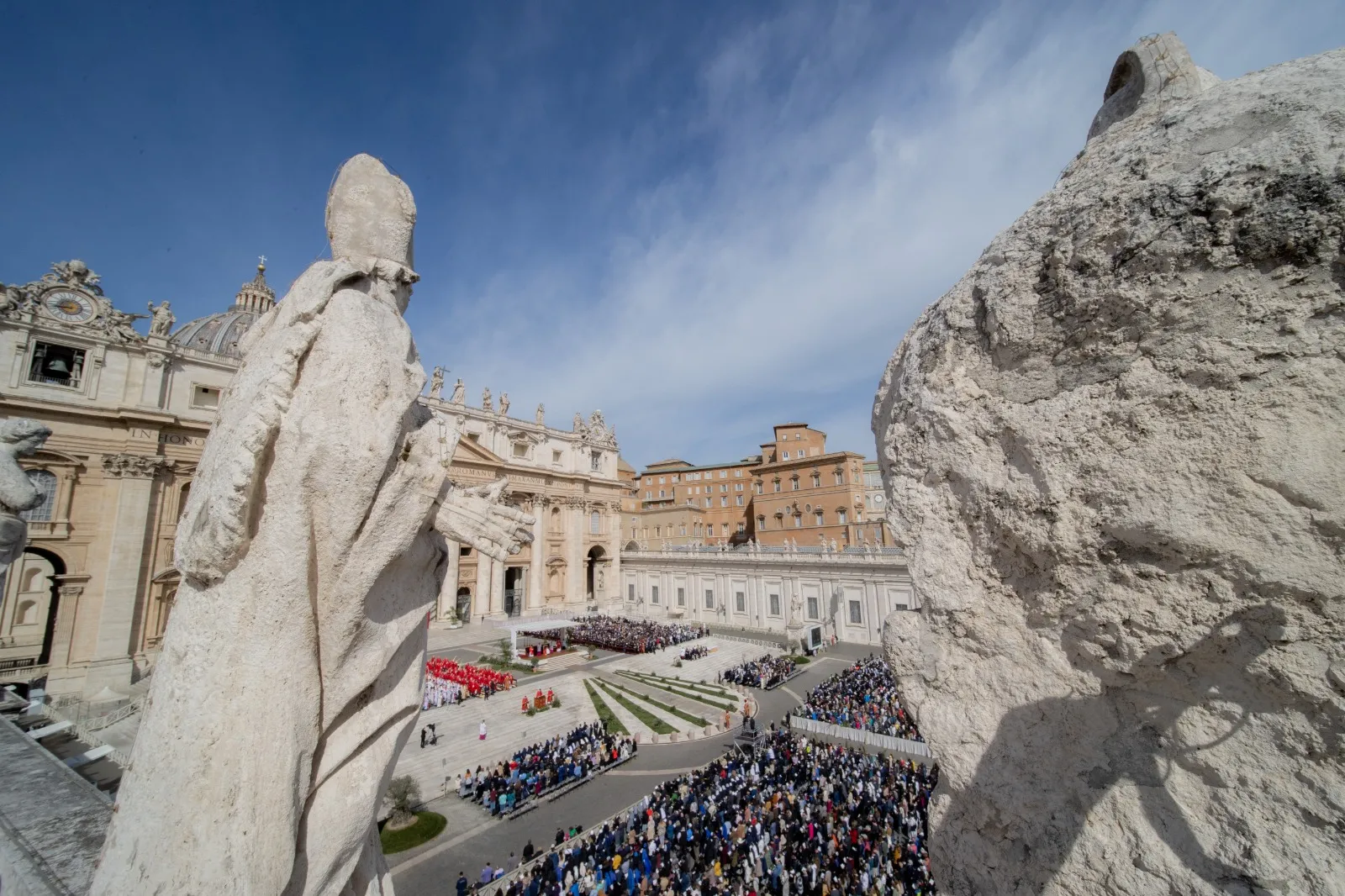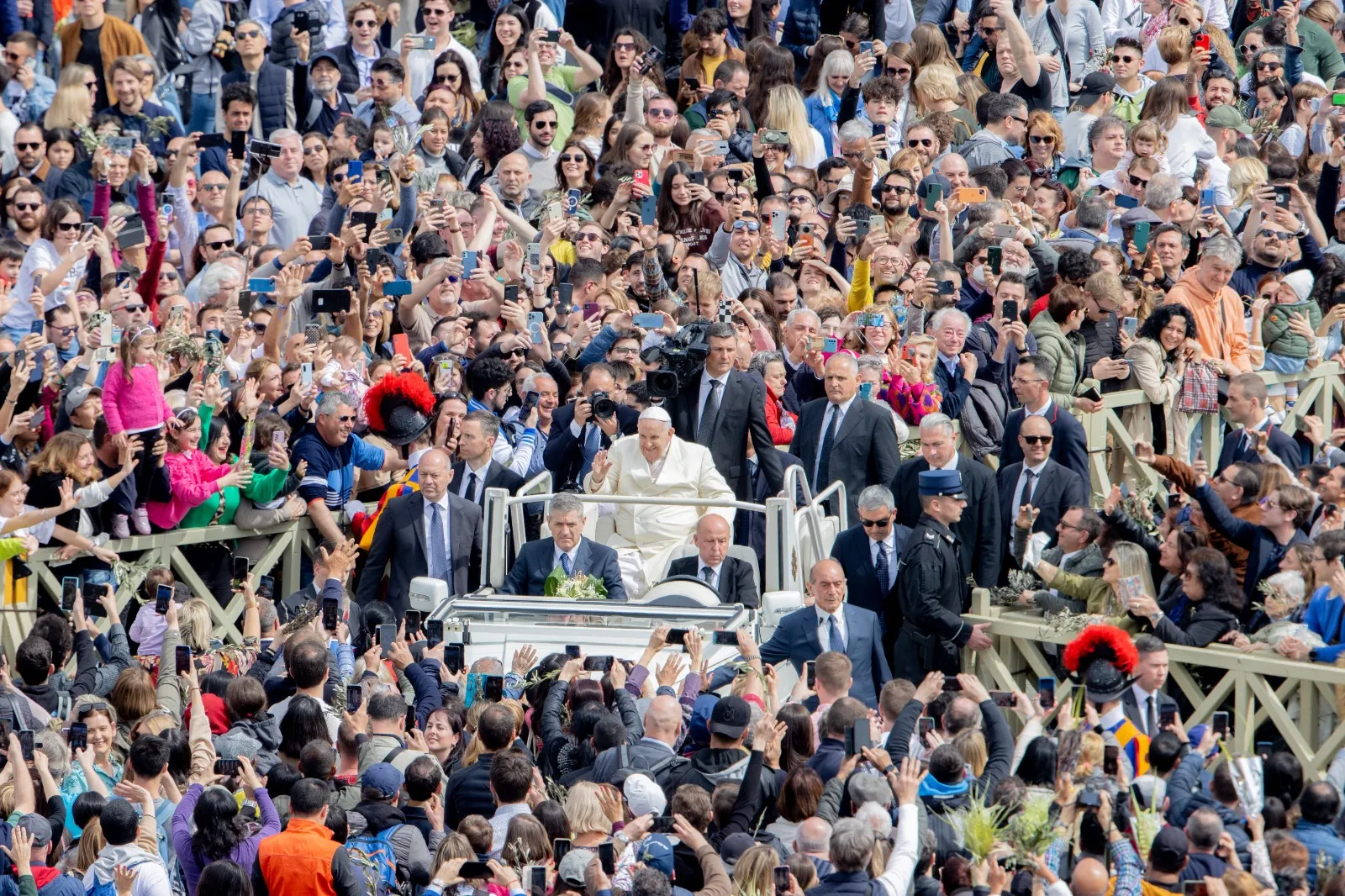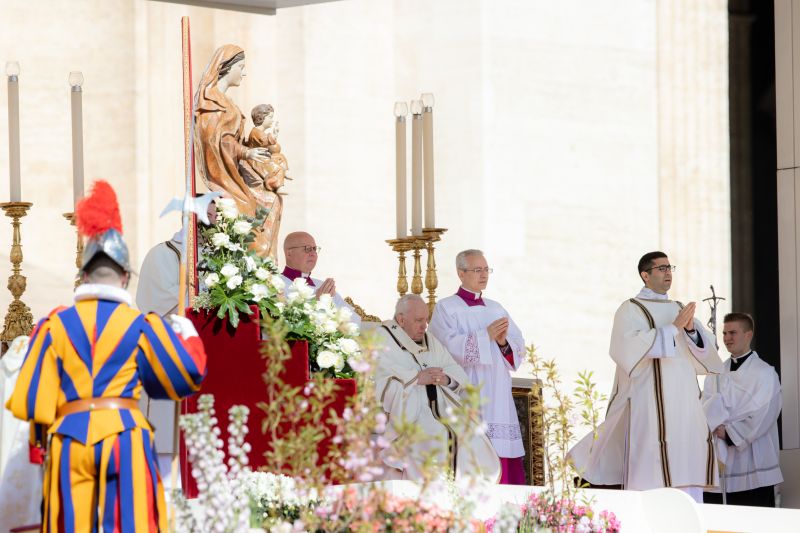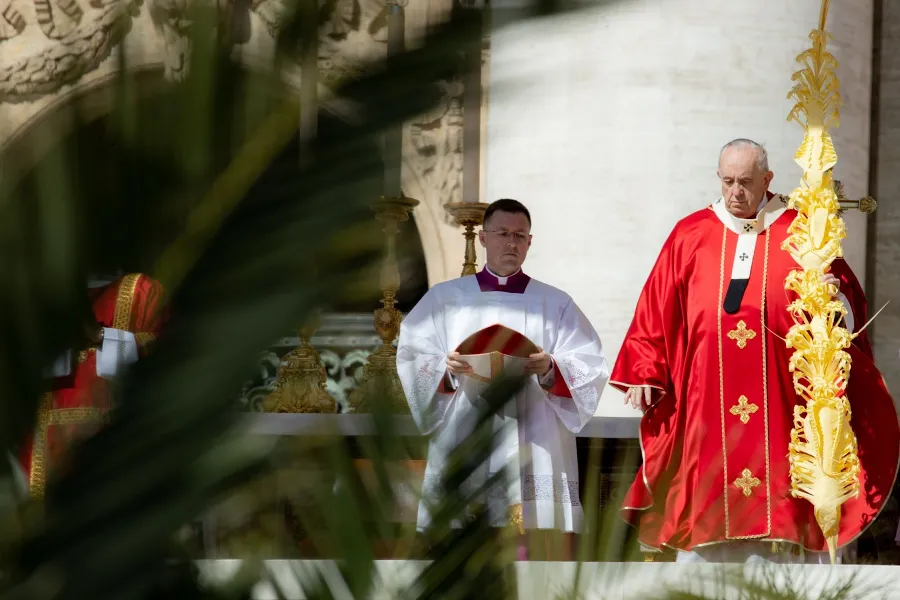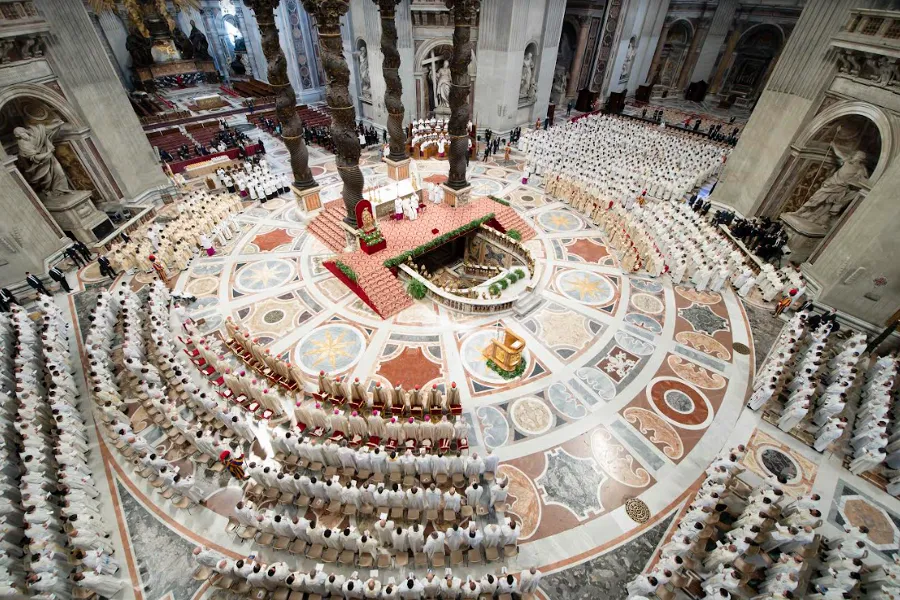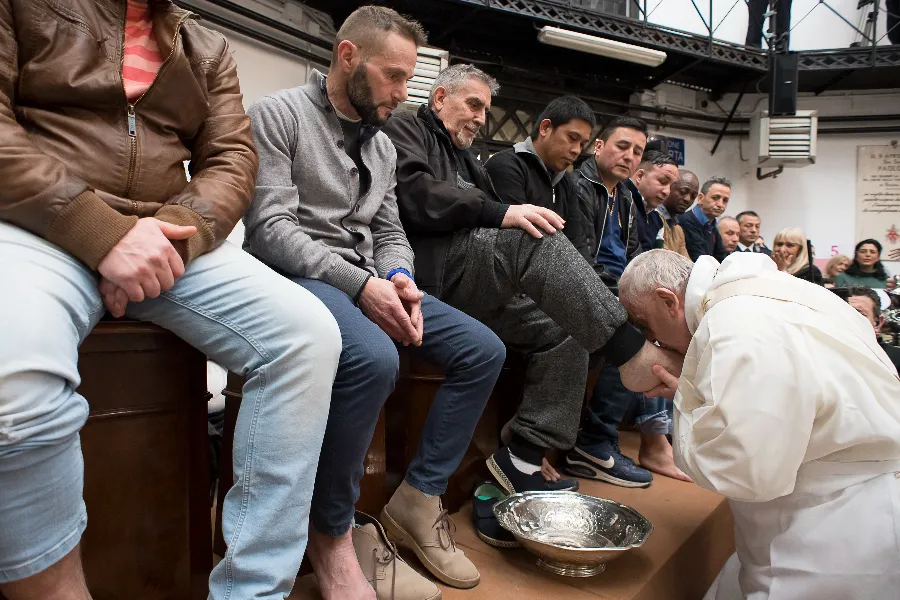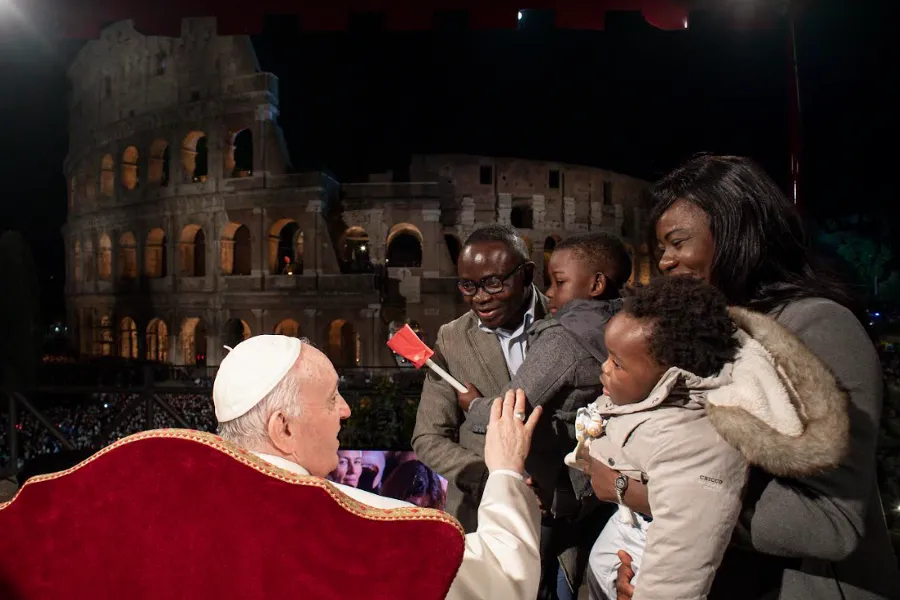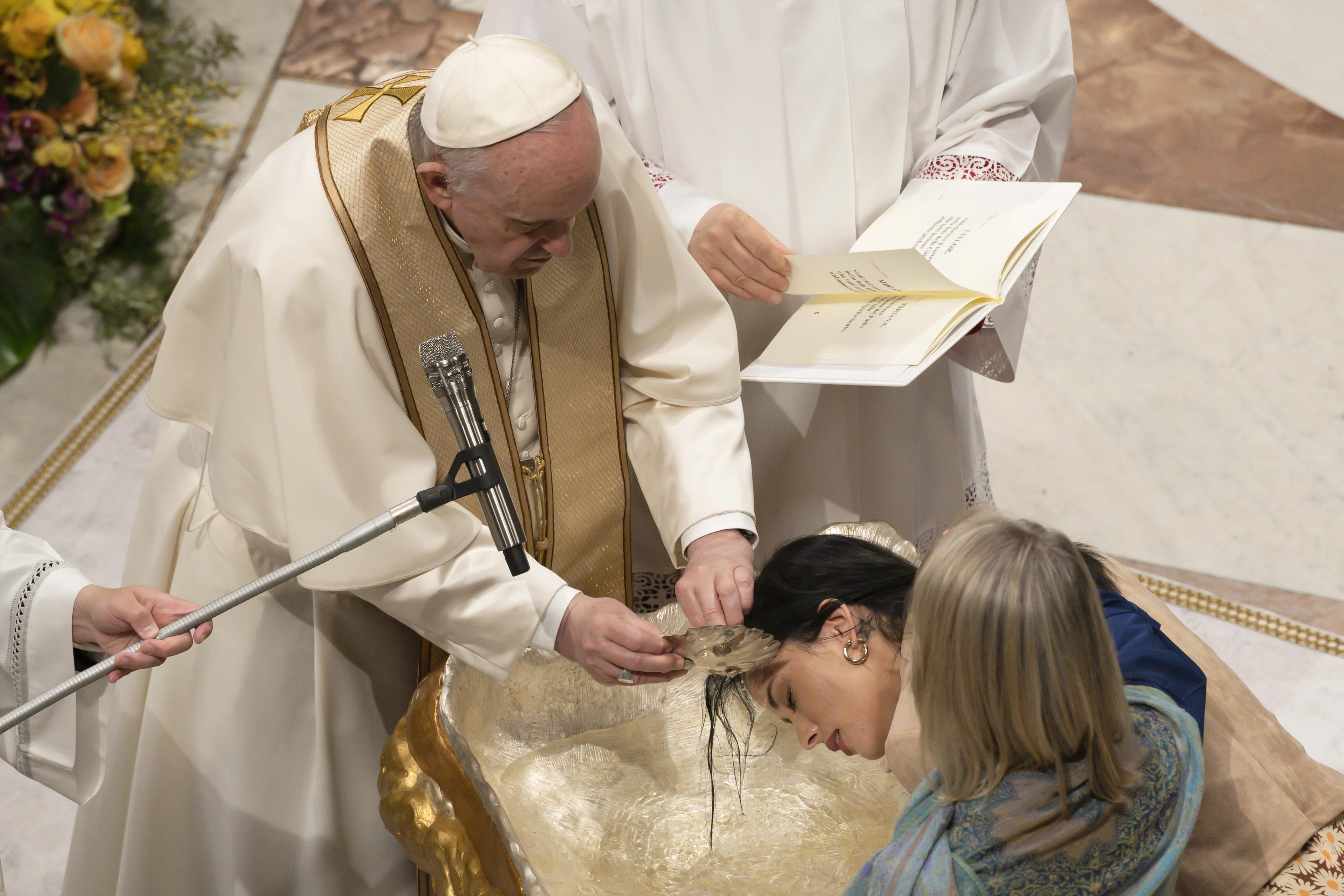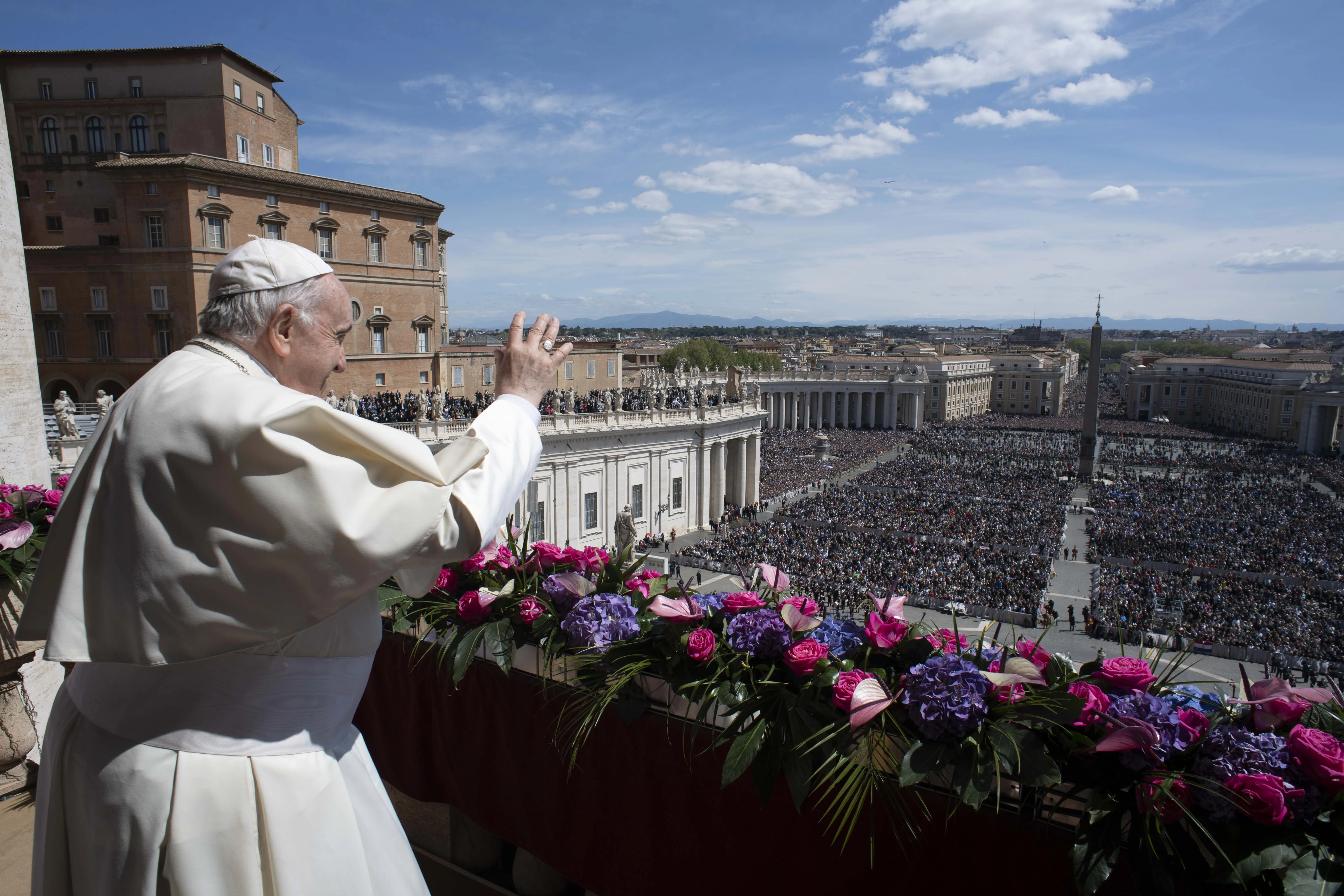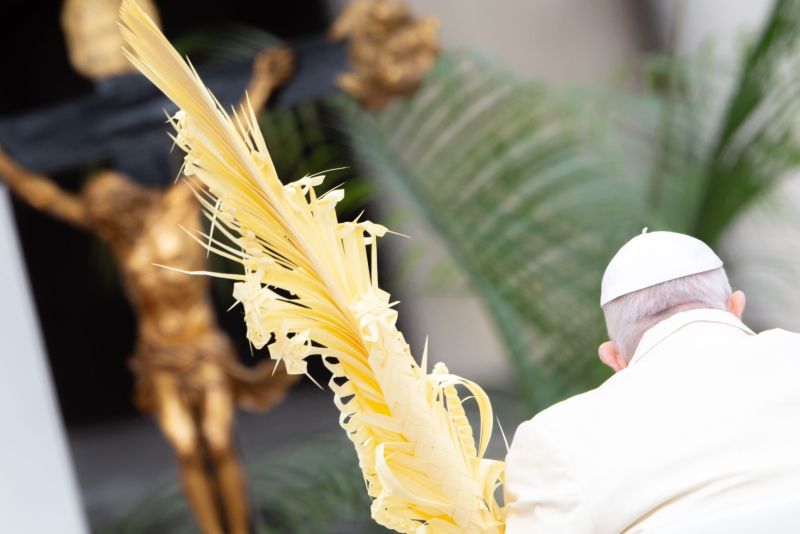 Pope Francis presided over Palm Sunday Mass in St. Peter’s Square on April 2, 2023. / Daniel Ibanez/CNA
Pope Francis presided over Palm Sunday Mass in St. Peter’s Square on April 2, 2023. / Daniel Ibanez/CNA
Vatican City, Apr 2, 2023 / 04:25 am (CNA).
Pope Francis presided over Mass for Palm Sunday 2023 in St. Peter’s Square on April 2. Below is the full text of his homily:
“My God, my God, why have you forsaken me?” (Mt 27:46). This is the cry that today’s liturgy has us repeat in the responsorial psalm (cf. Ps 22:2), the only cry that Jesus makes from the cross in the Gospel we have heard. Those words bring us to the very heart of Christ’s passion, the culmination of the sufferings he endured for our salvation. “Why have you forsaken me?”
The sufferings of Jesus were so man, and whenever we listen to the account of the Passion, they pierce our hearts. There were sufferings of the body: we think of the slaps and beatings, flogging and the crowning with thorns, and in the end, the cruelty of the crucifixion. There were also sufferings of the soul: the betrayal of Judas, the denials of Peter, the condemnation of the religious and civil authorities, the mockery of the guards, the jeering at the foot of the cross, the rejection of the crowd, utter failure and the flight of the disciples.
Yet, amid all these sorrows, Jesus remained certain of one thing: the closeness of the Father. Now, however, the unthinkable has taken place. Before dying, he cries out: “My God, my God, why have you forsaken me?” Jesus’ abandonment.
This is the most searing of all sufferings, the suffering of the spirit. At his most tragic hour, Jesus experiences abandonment by God. Prior to that moment, he had never called the Father by his generic name, “God,” never. [He uses] Father. To convey the impact of this, the Gospel also reports his words in Aramaic. These are the only words of Jesus from the cross that have come down to us in the original language. The event is real, and the Lord’s abasement extreme: It is the abandonment of his Father, the abandonment of God.
We find it hard even to grasp what great suffering he embraced out of love for us. It is not easy to understand. He sees the gates of heaven close, he finds himself at the bitter edge, the shipwreck of life, the collapse of certainty. And he cries out: “Why?” A “why” that embraces every other “why” ever spoken. But why, God, why?
“My God, my God, why have you forsaken me?” In the Bible, the word “forsake” is powerful. We hear it at moments of extreme pain: love that fails, or is rejected or betrayed; children who are rejected and aborted; situations of repudiation, the lot of widows and orphans; broken marriages, forms of social exclusion, injustice and oppression; the solitude of sickness. In a word, in the drastic severing of the bonds that unite us to others. There he tells us this word: abandonment. Christ brought all of this to the cross; upon his shoulders, he bore the sins of the world. And at the supreme moment, Jesus, the only begotten, beloved Son of the Father, experienced a situation utterly alien to his very being: the abandonment, the distance of God.
But, why did it have to come to this? For us. There is no other answer: Us. Brothers and sisters, today, this is not a show. Each of us has listened to the abandonment of Jesus, say to each other — each of us say to each other — “For me. This abandonment is the price he paid for me.”
He became one of us to the very end, in order to be completely and definitively one with us. He experienced abandonment in order not to leave us prey to despair, in order to stay at our side forever. Dear brother, dear sister, he did this for me, for you, because whenever you or I or anyone else seems pinned to the wall — and we have seen someone pinned to the wall — you see someone lost in a blind alley, plunged into the abyss of abandonment, sucked into a whirlwind of many “whys” without answer, there can still be some hope: Him, for you, for me.
It is not the end, because Jesus was there and even now, he is at your side. He has endured the distance of abandonment in order to take up into his love every possible distance that we can feel. So that each of us might say: in my failings — each of you has fallen many times — and I can say in my failings, in my desolation, whenever I feel betrayed or I have betrayed someone, when I feel cast aside or I have cast aside others or when I feel forsaken or have forsaken others, we think that Jesus was abandoned, betrayed, cast aside. And there we find him.
When I feel lost and confused, when I feel that I can’t go on, he is with me, he is there. In the thousand fits of ‘why’ and with many ‘whys’ without answer, he is there.
That is how the Lord saves us, from within our questioning “why?” From within that questioning, he opens the horizon of hope that does not disappoint. On the cross, even as he felt utter abandonment, Jesus refused to yield to despair, this limit; instead, he prayed and trusted. He cried out his “why?” in the words of the Psalm (22:2), and commended himself into the hands of the Father, despite the distance he felt (cf. Lk 23:46) or did not feel because he felt abandoned. In the hour of his abandonment, Jesus continued to trust. Even more: at the hour of abandonment, he continued to love his disciples who had fled, leaving him alone, and in the abandonment he forgave those who crucified him (v. 34). Here we see the abyss of our evil immersed in a greater love, with the result that our isolation becomes fellowship.
Brothers and sisters, a love like this, embracing us totally and to the very end, a love of Jesus like this, has the capacity to turn our stony hearts into hearts of flesh, and make them capable of mercy, tenderness and compassion. It is the style of God, this closeness, with passion and tenderness. God is like this. Christ, in his abandonment, stirs us to seek him and to love him and those who are themselves abandoned. For in them we see not only people in need, but Jesus himself, but him, he is with them, abandoned: Jesus, who saved us by descending to the depths of our human condition. He is like one of them: abandoned unto death. I think back to some weeks ago, that man, called homeless, a German man who died under the colonnade alone, abandoned. He is Jesus for each of us. Many people need our closeness, many abandoned people. I too need Jesus to caress me, to be close to me. Each of us need to find him in the abandoned, in the alone.
He wants us to care for our brothers and sisters who resemble him most, those experiencing extreme suffering and solitude. They are not only those people, but today, brothers and sisters, there are entire peoples who are exploited and abandoned; the poor live on our streets and we look the other way, we turn around; there are migrants who are no longer faces but numbers; prisoners are disowned; people written off as problems. But there are also many Christs, there are many, many Christs, people who are abandoned, invisible, hidden, discarded with white gloves: unborn children, the elderly who live alone — the elderly who live alone could also maybe be your dad, your mom, your grandpa, grandma, abandoned in geriatrics — the sick whom no one visits, the disabled who are ignored, and the young burdened by great interior emptiness, with no one prepared to listen to their cry of pain and who find another way toward suicide. The abandoned of today, the Christs of today.
Jesus, in his abandonment, asks us to open our eyes and hearts to all who find themselves abandoned. For us, as disciples of the “forsaken” Lord, no man, woman or child can be regarded as an outcast, no one left to himself or herself. Let us remember that the rejected and the excluded are living icons of Christ: they remind us of his reckless love, his forsakenness that delivers us from every form of loneliness and isolation. Brothers and sisters, today let us implore this grace: to love Jesus in his abandonment and to love Jesus in the abandoned all around us, in the abandoned all around us. Let us ask for the grace to see and acknowledge the Lord who continues to cry out in them. May we not allow his voice to go unheard amid the deafening silence of indifference. God has not left us alone; let us care, then, for those who feel alone and abandoned. Then, and only then, will we be of one mind and heart with the one who, for our sake, “emptied himself” (Phil 2:7). Totally emptied for us.
[…]



